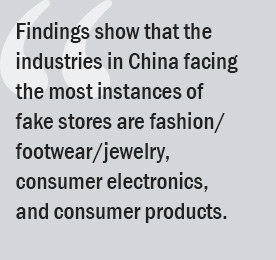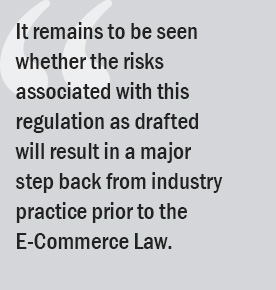China Subcommittee of the Anticounterfeiting Committee Prepares for Implementation of E-Commerce Law
Published: May 1, 2019
 The E-Commerce Law of the People’s Republic of China (PRC E-Commerce Law) came into effect on January 1, 2019. This new law covers a wide range of issues relating to e-commerce, including intellectual property (IP), platform liabilities, consumer protection, taxation, electronic payment, data protection, and antitrust.
The E-Commerce Law of the People’s Republic of China (PRC E-Commerce Law) came into effect on January 1, 2019. This new law covers a wide range of issues relating to e-commerce, including intellectual property (IP), platform liabilities, consumer protection, taxation, electronic payment, data protection, and antitrust.
Some IP owners have raised concerns regarding certain provisions of this new law. These concerns underscore the need for the implementing rules, which have not yet been made available.
In anticipation of the release of the implementing rules, the China Subcommittee of the Anticounterfeiting Committee (ACC) has been preparing for the PRC E-Commerce Law by engaging with local government officials regarding the law’s implementation. It has also submitted comments during all three public consultations held by the National People’s Congress of China since 2017. The ACC China Subcommittee will be increasing local engagement through policy dialogues and high-level meetings to discuss the new law’s impact on the private sector.
As part of these engagement activities, ACC China Subcommittee Chair, Erika Yawger (Apple Inc., USA) will be moderating a panel during INTA’s 2019 Annual Meeting in Boston, Massachusetts, USA, on “Anticounterfeiting in China.” The session, which takes place on May 19, at 10:00 am, will provide an overview of traditional methods of anticounterfeiting enforcement (including online enforcement), emerging issues and developments, and topics relevant to achieving effective brand enforcement in China.
In preparation for the ACC’s advocacy efforts, the China Subcommittee has highlighted some key clauses from the PRC E-Commerce Law.
Scope of E-Commerce (Article 2)
Although the PRC E-Commerce Law does not explicitly mention social media platforms, many believe that the definition of “e-commerce” given in Article 2-“operational activities of selling goods or providing service through Internet and other information networks”-was intended to include social media services, an area in which IP owners often face challenges during enforcement of their rights.
Note that the PRC E-Commerce Law does not apply to financial products and services, news information, audio and video programs, publications, cultural products, or other content provided through information networks.
Counter Notices (Article 43)
Article 43 was intensively debated during the PRC E-Commerce Law’s consultation phase. Under this provision, if an online vendor files a counter notice with prima facie evidence of non-infringement, the e-commerce platform operator must cease any measures taken against the alleged infringement-unless the IP-owner submits evidence that a complaint against the vendor’s infringement has been filed with a judicial and/or administrative authority. The IP owner must submit this evidence within 15 days of being notified of the vendor’s counter notice.
This provision raises concerns over the following issues:
- The lack of a clear definition of prima facie evidence;
- The lack of a platform’s discretionary power over the vendor’s prima facie evidence and the obligation by the platform operator to release its enforcement measures in a timely manner after a counter notice is filed;
- The lack of opportunity for the IP owner to respond to the vendor’s counter notices and prima facie evidence;
- The 15-day deadline for IP owners to file infringement complaints with juridical and/or administrative authorities; and
- The amount of resources that would be required for IP owners-and authorities-to file these civil and/or administrative complaints.
 The counter-notice mechanism, as provided by the PRC E-Commerce Law, threatens to impose enormous burdens on IP owners to pursue civil and/or administrative actions, and potentially creates a loophole that could be exploited by infringers with groundless counter notices.
The counter-notice mechanism, as provided by the PRC E-Commerce Law, threatens to impose enormous burdens on IP owners to pursue civil and/or administrative actions, and potentially creates a loophole that could be exploited by infringers with groundless counter notices.
It remains to be seen whether the risks associated with this regulation as drafted will result in a major step back from industry practice prior to the PRC E-Commerce Law. Article 43 remains the chief concern for IP owners for online brand protection and anticounterfeiting in China, unless and until further clarification is provided by the Implementing Rules.
Constructive Knowledge (Article 45)
Article 45 of the PRC E-Commerce Law stipulates that a platform operator must take necessary measures if it “knows or should know” of any vendor’s infringement of IP rights; otherwise, the platform operator becomes jointly and severally liable for the infringement.In addition to actual knowledge, the explicit inclusion of constructive knowledge is a step forward compared with Article 36 of the PRC Tort Liability Law, which only imposes liabilities on a platform operator’s actual knowledge of infringement. Note though, imposing liabilities based on a platform operator’s constructive knowledge is not new, as this has already been supported by numerous PRC courts in judicial practice. However, Article 45 of the PRC E-Commerce Law further clarifies this issue.
Malicious Complaints (Article 42.3)
According to this provision, a complainant will be held civilly liable for any damages caused to vendors due to wrongful complaints. For malicious complaints, additional liability will be imposed on the bad-faith complainant. This provision will help address issues arising from malicious complaints aimed solely at disrupting or extorting a vendor’s legitimate business.
Prior to the PRC E-Commerce Law, vendors successfully relied on the PRC Anti-Unfair Competition Law to seek relief. The new PRC E-Commerce Law provides another ground for legitimate vendors to protect their interests. China’s first Internet Court in Hangzhou also recently indicated that Article 42.3 of the PRC E-Commerce Law can be relied upon in such matters.
Vendor Business Registration and Access to Identification Information (Articles 15, 28, and 76)
Article 15 of the PRC E-Commerce Law requires that vendors display their business registration and certification information at a prominent place on their home page. This will eliminate the need to request such information from platforms, directly or indirectly (through court actions), thus making it much easier for IP owners to pursue actions against vendors selling infringing products.
Failure to comply with these requirements could result in monetary fines for both the vendor and the platform operator, according to Article 76.
Further, platform operators are required under Article 28 to submit vendors’ identification information to local administrative authorities. For vendors that are required by law to incorporate, but have not yet done so, platform operators are required to remind them of this requirement.
Protection of Consumer Safety and Health (Article 38)
The PRC E-Commerce Law clarifies under Article 38 that platforms can be held jointly and severally liable if they “know or should know” sales of goods that do not meet relevant personal or property safety requirements, or otherwise violate consumer legitimate rights and interests but fail to take necessary measures.
For goods or services that may affect consumers’ life and health, platforms will also need to bear “corresponding proportionate liability” in case of harm to consumers due to the platform’s failure to protect consumers’ safety, or failure to verify the vendor’s relevant qualifications.
Noncompliance can lead to fines to platforms in the range of RMB 50,000 to RMB 2 million (approximately US $7,500‒300,000), depending on the seriousness of the circumstances.
As many infringing products do not meet relevant mandatory health and safety standards, this provision may provide IP owners with an alternative method of enforcing against infringing products.
Concluding Remarks
As the PRC E-Commerce Law engendered intense debate during the drafting and consultation phases, it is likely that balancing the interests and concerns of the various stakeholders will be equally challenging during the issuance of the implementing rules.
There is no clear timeline yet for the implementing rules, but the ACC will closely monitor the developments of the rules in its advocacy efforts.
For more information on INTA’s anticounterfeiting activities, please contact INTA’s Anticounterfeiting Manager Maysa Razavi at [email protected], Anticounterfeiting Advisor Tiffany Pho, at [email protected], or Anticounterfeiting Advisor Asia-Pacific Valentina Salmoiraghi at [email protected].
Although every effort has been made to verify the accuracy of items in the INTA Bulletin, readers are urged to check independently on matters of specific concern or interest.
© 2019 International Trademark Association